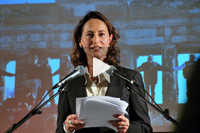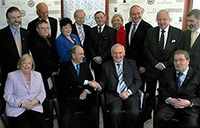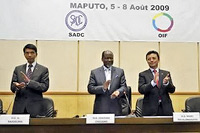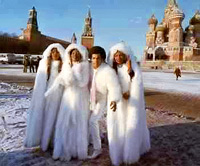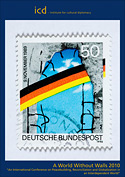A World Without Walls 2010
”An International Conference on Peacebuilding, Reconciliation and Globalization in an Interdependent World”
 On the 21st anniversary of the fall of the Berlin Wall, as the eyes of the world fall upon Germany's capital once again, the Institute for Cultural Diplomacy and other leading organizations will host A World Without Walls 2010. The conference will bring together scholars and academics, civil society practitioners, journalists, political and diplomatic representatives, and other interested stakeholders for a five-day program of lectures and panel discussions featuring renowned figures from international politics, diplomacy, academia, and civil society. Cultural and social activities (») will complement the academic components and provide an opportunity for participants to expand their personal networks and experience Berlin's rich cultural landscape on an important occasion in the city's history.
On the 21st anniversary of the fall of the Berlin Wall, as the eyes of the world fall upon Germany's capital once again, the Institute for Cultural Diplomacy and other leading organizations will host A World Without Walls 2010. The conference will bring together scholars and academics, civil society practitioners, journalists, political and diplomatic representatives, and other interested stakeholders for a five-day program of lectures and panel discussions featuring renowned figures from international politics, diplomacy, academia, and civil society. Cultural and social activities (») will complement the academic components and provide an opportunity for participants to expand their personal networks and experience Berlin's rich cultural landscape on an important occasion in the city's history. There is a general consensus that the process of globalization is creating a world in which individual nation states are increasingly interdependent and interconnected. National approaches to issues including international politics, trade and economics, healthcare, immigration, tourism, and climate change are therefore increasingly dependent on the policies and approaches of neighboring states and international partners.
Despite this growing interdependence, there remain major cultural, political, religious, and economic disputes as well as a large number of conflicts across the world with deep-rooted historical experiences, from political conflict at the international level to violent conflict at the sub-national level. The de-escalation of these disputes and conflicts requires creative thinking and new approaches that take into account both the history of the divisions and the evolving global context within which they are set.
A World Without Walls 2010 will look in detail at the major conflicts across the world today, from disputes amongst communities at the local level to international disputes between regions and multi-lateral organizations. Through constructive discussion and debate the conference will assess the changing global environment and explore how non-governmental organizations, governments, and individual stakeholders can support peacebuilding, reconciliation, and conflict de-escalation across the world.
Conference Participants»
The conference is open to applications from young professionals, students and scholars, civil society practitioners, private sector representatives, journalists, and other interested stakeholders from across the world.Program Agenda
"A World Without Walls 2010" will pursue the following specific aims:
- To analyze historical and contemporary case studies of disputes and conflicts from across the world to identify best practice guidelines for conflict de-escalation
- To examine how strategies for peacebuilding and reconciliation using soft power and cultural diplomacy can be implemented in crisis areas around the world
- To identify and discuss barriers to equality and coexistence, including: the digital divide, the poverty gap, membership of international organizations, minority discrimination, and trade protection
- To explore and raise awareness of new approaches to peacebuilding and reconciliation that employ soft power and cultural diplomacy
- To assess the evolution of the global political system since the fall of The Berlin Wall, with a particular focus on European integration
- To consider how governments, civil society, and the private sector can better co-operate in promoting peace and stability
- To examine the role of regional organizations and international security organizations in addressing international conflict
- To analyze the relationship between democracy, human rights, and peacebuilding in states with a history of violent conflict
The following issues will be mentioned and explored:
- International Politics in a New World Order (Focus: the UN Security Council, regional organizations, uni-polarity vs. multi-polarity)
- Cultural & Religious Disputes (Focus: Interfaith dialogue, religious extremism, religious expression and human rights, minority rights, US-Iranian relations)
- International Peaecekeeping (Focus: Sudan, D.R. Congo, Kosovo, Lebanon, Timor Leste)
- Democracy and Human Rights in Post-Conflict States (Focus: Afghanistan, Iraq, Rwanda, Liberia, Cote d’Ivoire)
- Alternative Approaches to Community Justice and Reconciliation (The Gacaca courts in Rwanda)
- Individual Nation States as Promoters of Peacebuilding (Focus: Norway, Denmark, Canada)
- Anti Nuclear-proliferation and the Arms Trade (Focus: The challenge of nuclear armament, arms control and the arms trade)
- International Humanitarian Law (Focus: exploring human rights violations in situations of armed conflict)
- Genocide (Focus: Bosnia, Rwanda, Sudan and the unspoken crime of Genocide)
- Northern Ireland (Focus: inter-religious conflict and the Northern Ireland Peace Process)
- The Former Yugoslavia (Focus: Kosovo, Macedonian-Greek Relations, Bosnia and Herzegovina)
- Spain (Focus: Basque Nationalism, Catalanism)
- Romania and Bulgaria (Focus: Minority rights)
- Belgium (Focus: Intra-national relations between the Flemish, French, & German Communities)
- Turkey (Focus: Turkey-EU Relations, Cyprus, Turkish-Greek relations, EU membership)
- Israel-Palestine (Focus: The Israeli-Palestinian conflict, the Middle East, Iran)
- USA and Cuba (Focus: Cultural diplomacy and ideological differences)
- China (Focus: US-China relations, Japan–China relations, South China Sea disputes)
































































































